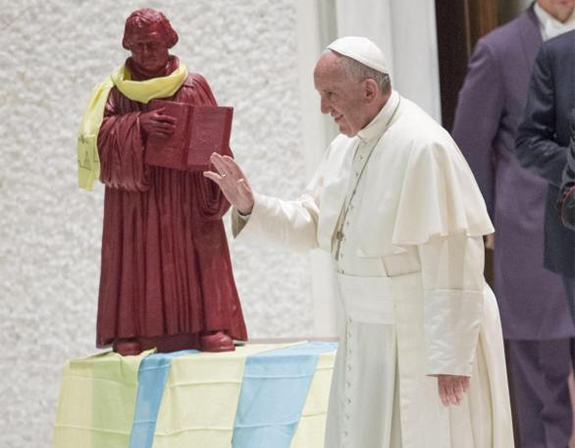
A letter twenty-five pages long laid out the perceived heresies committed, taught or espoused by Pope Francis, was signed by 40 Roman Catholic Leaders and delivered to him to consider. Nearly two weeks later, the Pope has not responded and those Roman Catholic leaders have made their letter public, conjoining it with the “Feast of Our Lady of Ransom.” The letter accuses the Pope of seven different heresies, most dealing with human sexuality and receiving the sacraments.
Entitled, “Correctio Fillialis de Haeresibus Propogatus,” the document has three main parts. The first part of the document specifies that the clergy signing the letter are not arguing with papal infallibility, because “the Church teaches that a pope must meet strict criteria before his utterances can be considered infallible.” The letter specifies that the Pope hasn’t said that his heretical viewpoints are officially the dogmatic teaching of the church, and so the writers specify they’re not challenging his papal infallibility.
The second part of Correctio Fillialis de Haeresibus Propogatus specifies which heresies are taught by Pope Francis in his Amoris laetitia, a “post-synodal apostolic exhortation” (position paper) published by him in 2016. The Roman Catholic leaders allege that the Pope expressed or implied these heresies in the Amoris laetitia. These particularly deal with Francis’ departure from Romish orthodoxy by his lighter views on adultery and fornication.
The third part of Correctio Fillialis de Haeresibus Propogatus accuses the Pope of falling for the encroachments of “modernism” and [drum-roll please], the influence of Martin Luther on Pope Francis. No, not Karl Marx…Martin Luther.
You can find the document, here.
Accusing Francis of being influenced by Luther, the document says…
In the second place, we feel compelled by conscience to advert to Your Holiness’s unprecedented sympathy for Martin Luther, and to the affinity between Luther’s ideas on law, justification, and marriage, and those taught or favoured by Your Holiness in Amoris laetitia and elsewhere necessary in order that our protest against the seven heretical propositions listed in this document may be complete; we wish to show, albeit in summary form, that these are not unrelated errors, but rather form part of a heretical system. Catholics need to be warned not only against these seven errors, but also against this heretical system as such, not least by reason of Your Holiness’s praise of the man who originated it [emphasis ours].
The document then lists specific homilies given by Pope Francis in which he spoke sympathetically of Luther, as evidence that he had been influenced by the Reformer.
This development really is fascinating. First, the letter accuses Francis of heresy, while still clinging to the dogma of papal infallibility through a loophole in interpretation that is altogether unclear. Secondly, it is worth noting that Protestants are not the only ones seeing Francis being a leftist, and these Romanists are very politely – but very clearly – calling out their own Pope for his positions on social issues. Third, in typical Romish fashion, these Papists blame Martin Luther for Francis’ drift left.
There is no word about how the letter was delivered to the Pope, as to whether it was the Vatican postal service or it was nailed to his door.
[Update: The Vatican has blocked its internet servers from accessing the website collecting signatures for Correctio Fillialis de Haeresibus Propogatus so that it cannot be accessed by anyone in the Vatican City]











